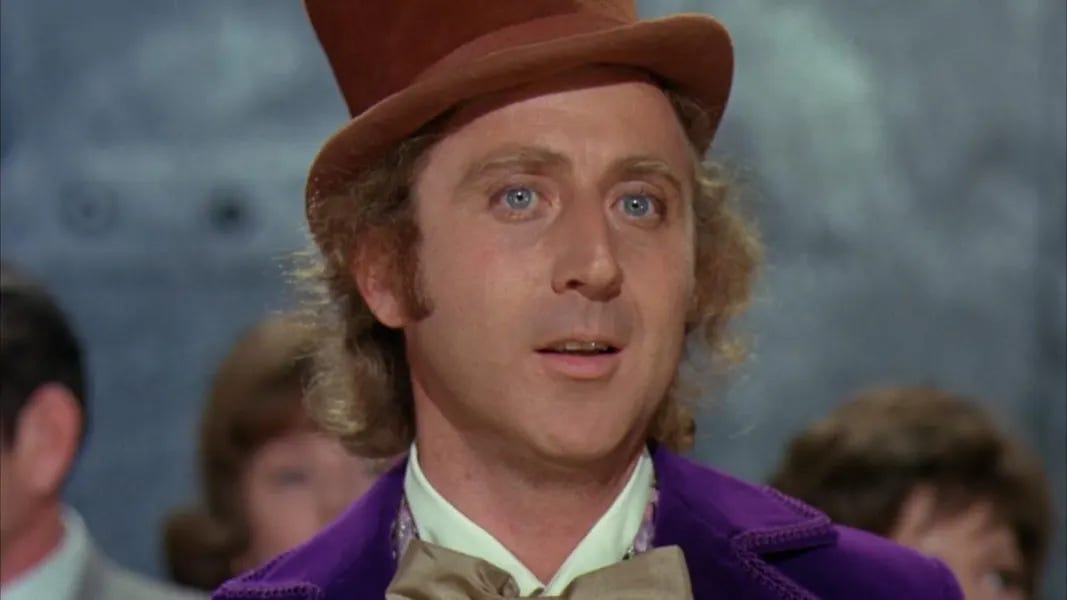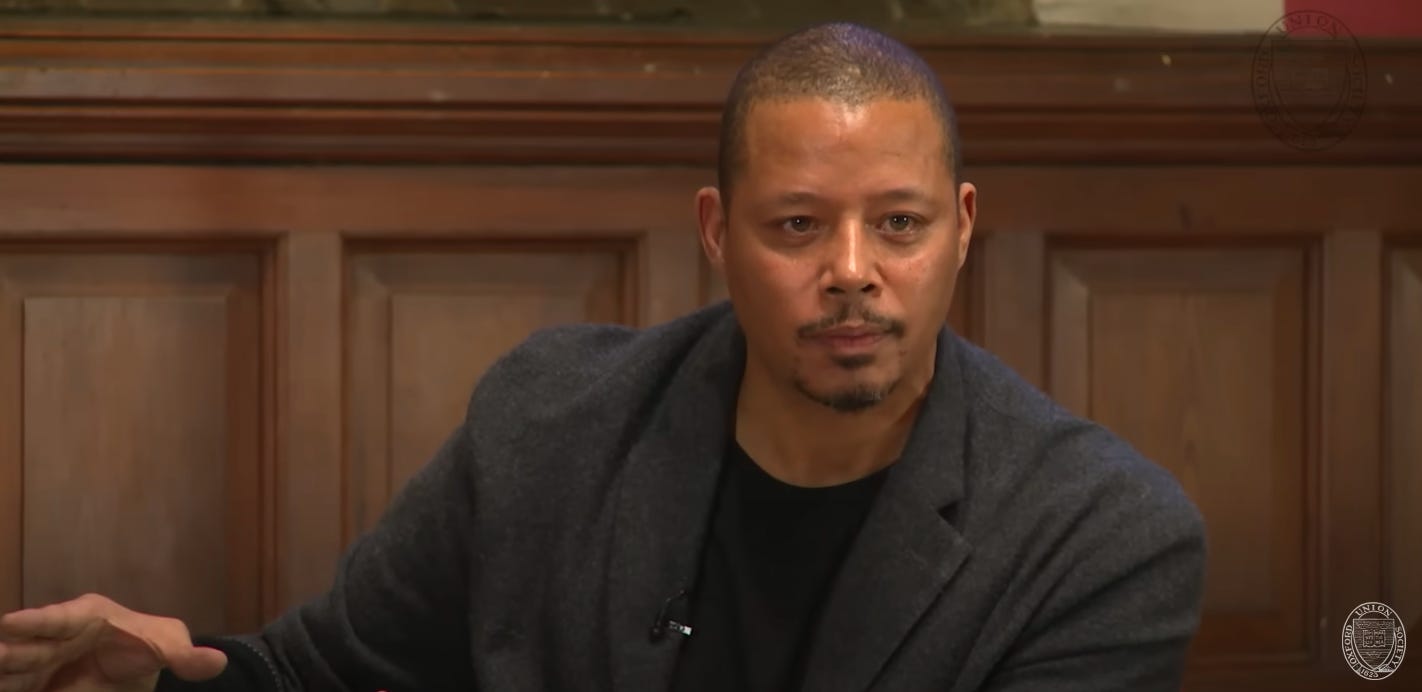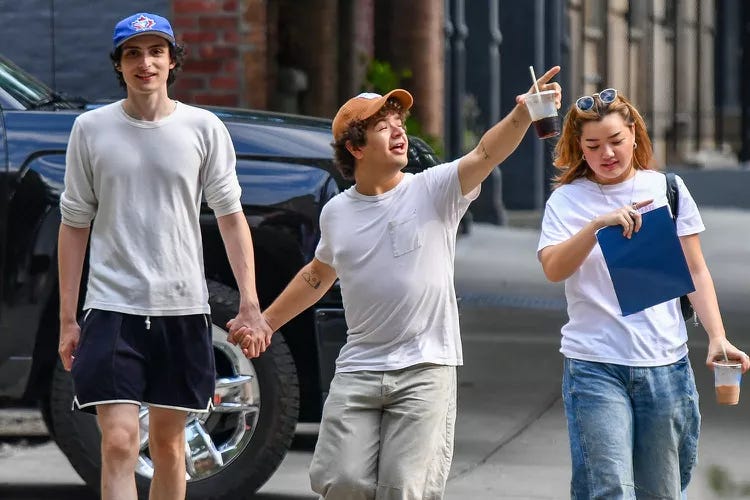Gene Wilder vs Terrence Howard
The stakes of an American cautionary tale
One of my earliest life memories is watching Willy Wonka and the Chocolate Factory. I have no idea how many times I watched it on my tiny black-and-white television, nor did I realize what a stunning performance Gene Wilder had given. I just remember being obsessed with the film, over a decade after its 1971 release.
So I was pleased to discover how incredible a co-star Wilder was while watching Remembering Gene Wilder, the excellent documentary about his life. What struck me most was the interview with Peter Ostrum, who played Charlie Bucket in the original adaptation.
Ostrum was 12 when selected to perform as Wilder’s co-star. A sixth grader in a small theater company in Ohio, Ostrum was not a natural choice given the number of child actors in Hollywood. But it turns out he was ideal for the role—a fact made apparent, in part, due to Wilder’s guiding hand.
According to the documentary, every actor Wilder worked with was elevated by his presence and direction. He wanted the best out of his team, and in return, he demanded the best of himself. What repeatedly came across during the 92-minute film was the respect Wilder earned from those around him, how caring a man he was.
I watched the documentary just days after breaking down a 2017 Oxford Union presentation by Terrence Howard for Conspirituality. In the wake of his Joe Rogan Experience appearance, where he claimed that 1x1 really equals 2 (which he’s made for nearly a decade), I wanted to trace back to the origins of this absurdity. While watching the performance, an unrelated moment leapt out at me.
While his presentation was about mathematics, most people asked about his acting career during the Q&A. At one point, Howard discusses his attitude about working with other actors.
My thing is I have no toleration for rivalry whatsoever. It’s not black eyes and bloody noses. For me, it’s life or death when I’m in that ring. And that ring is the set and the stage for me, so I’m coming in there to dismantle you. I’m coming in there to take away any falsehood that you have that you were carrying yourself with. I want to shake that up with truth and to where you don’t even know your lines afterwards. That you’re just sitting there. So if you can’t come in ready for life or death…you will lose your life in that game.
Again, he’s speaking about his co-stars. I’ll admit my ignorance here: from my limited time working in theater in NYC in the late nineties / early aughts, most of my experiences were more like Wilder. Senior actors lifted up younger ones. They all worked together for the good of the production. Sure, there’s always competition, and I never worked on the level of Broadway, where life is certainly more vicious.
But the idea that an actor would want to destroy another actor, to the point where they get their scenes cut, is so counterproductive and selfish that such a worldview wouldn’t even enter my consciousness. And yet, here we are as a culture, holding up an actor who, among spreading ridiculous misinformation about math, vaccines, and much more, is lauded for professional violence.
Watching Gene Wilder, and how those who loved and cherished him felt, was like a breath of fresh air. A reminder that you don’t have to be depraved and maniacal in your craft, that holding others up makes you a better performer, and a better human.
And then, there was the end. Watching Wilder’s struggle with Alzheimer’s disease was difficult. I recalled the last time I saw my paternal grandmother who, after her husband, my pop-pop, had died, slipped quickly into dementia. She kept calling me by my sister’s name. Once, she thought I was my cousin. When corrected, I watched her put her elbows on the table, head in hands, reaching for a reality she once grasped firmly but could no longer. I saw my nanny in Wilder’s distant gaze.
This was shortly after I worked in an emergency room for two years, watching after suicidal patients, a number of whom were mentally ill. It’s one thing to watch it from afar, in terms of relationship, not physical distance. It’s another to grapple with it when someone you’ve known your entire life is going through it.
For better and worse, it appears that Wilder had little sense his mind was slipping away. From what I understand of memory loss, the person experiencing it sometimes doesn’t know it’s happening. Not always, of course, but there are plenty of cases that suggest ignorance is bliss. Or, at least, forgetting is not the tragedy for the person that those around them experience.
Right now, we have an opportunity to have a national discussion about two topics that Americans regularly avoid: aging and mental decline. A healthy society would use this moment to educate, because aging is something every single one of us will do, and mental decline will hit the majority of us. Being mature enough to have tough conversations would benefit us individually, as families, and as a culture.
Tragically, we’re taking the Terrence Howard approach: destroy everything. Mock. Ridicule. Denounce and despise. Or, as I’ll get to, ignore and pretend it’s not happening.
Health shouldn’t be a blood sport, but everything is. A parallel example: yesterday, the photo below, featuring Stranger Things stars Finn Wolfhard and Gaten Matarazzo, was all over social media.
As you might expect, the focus was on two young men holding hands. Again, an anecdote: decades ago, I was heavily involved in the Indian and Pakistani communities as a journalist and DJ in New York City. One evening at SOB’s, a friend put his arm around me, face inches from mine, to have a conversation. He paused, asking permission. “Where I’m from, men regularly touch when talking, but Americans are different, so I should I ask if it’s ok with you.” Yes, it was; he was a close friend. What could be wrong with intimate contact while sharing a moment of camaraderie? It would be weird not to be close, to touch.
But—America. The threads on Wolfhard and Matarazzo were filled with homophobic rhetoric, even though Matarazzo’s girlfriend, Elizabeth Yu, is clearly in the photo. (Some people cropped it to remove her, because of course they did.) So again, a chance to discuss one of the most important aspects being a young man, how to have close relationships with other men without feeling “icky,” is gone become too many people are not mature enough to have those conversations.
Kudos to these two men for showing us a positive example.
Which is what we need right now when it comes to talking about aging and mental decline. The stakes are too high, for our society and existence, to let trolls dominate the conversation, insecure men who see life as a zero-sum game.
The stakes are also too high to let well-meaning liberals bury their heads in the sand, as if we all can’t see what’s right in front of our eyes. This isn’t to diagnose—none of us non-professionals can do that—but it’s also not to pretend we can’t see what many of us have seen up close and intimately a number of times before.
Democracy depends on honesty and empathy. Many aren’t interested in cultivating those qualities. Our only job right now—the people who care about keeping and even strengthening democratic principles—is to outnumber the trolls, those who would destroy everything around them for some imperceivable selfish affliction.
We need to be Gene Wilder. Either try to lift Terrence Howard up, or ignore him entirely while he screams into the void.





